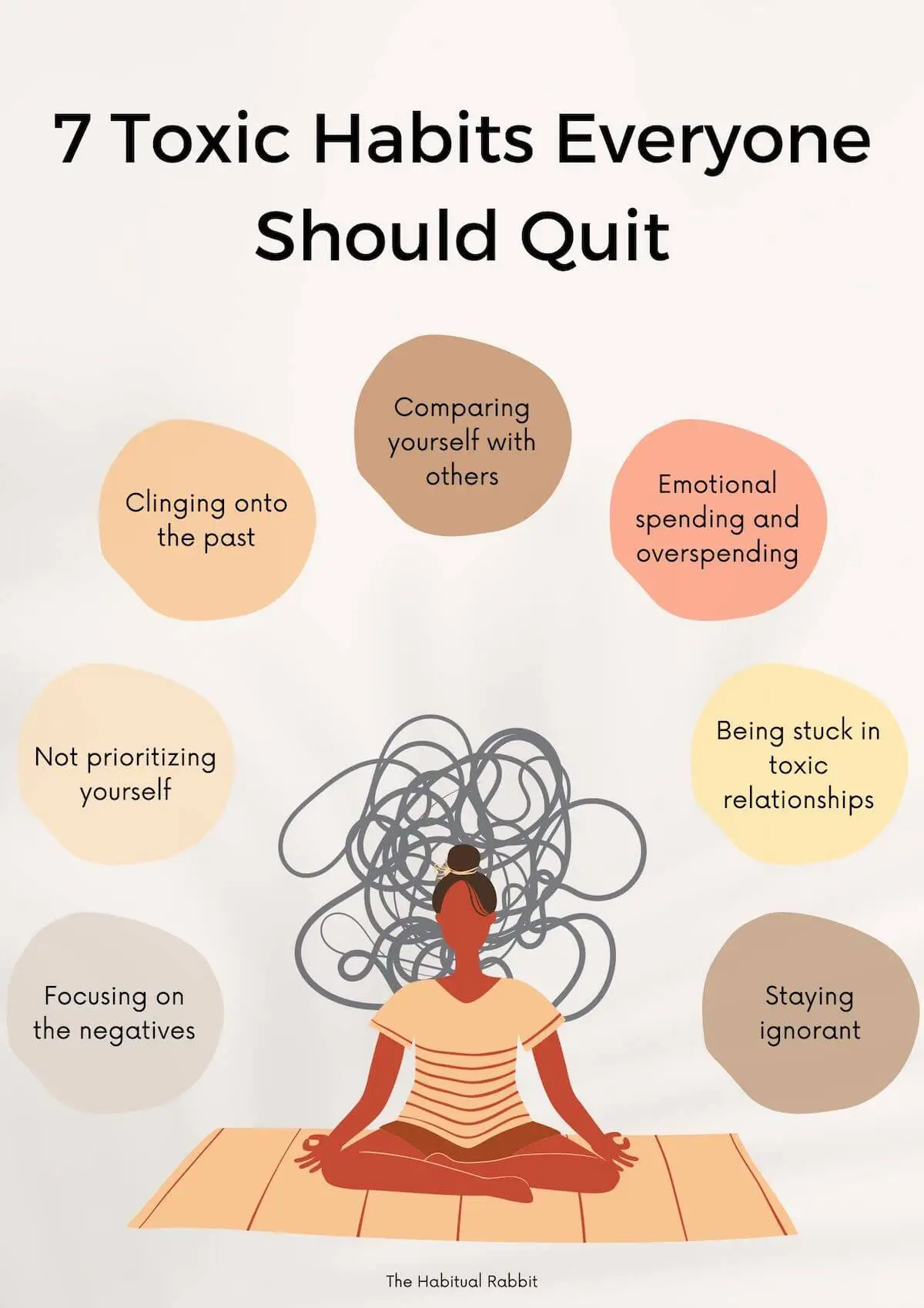
It’s tough to break free from our toxic habits. These behaviors are deeply ingrained in us from a young age and later hold us back from reaching our full potential.
Before starting this journey, it’s important to acknowledge our imperfections. No one is perfect, and we all have our own toxic habits that we may not even be aware of.
We are all a work in progress…if we choose to be.
Here are 7 toxic habits everyone should strive to quit.

1. Comparing yourself with others
Why you should quit
Social comparison theory suggests that people assess their personal and social worth by comparing themselves to others.
Social media has become a significant part of our lives. We spend a considerable amount of time scrolling through reels and stories. Unfortunately, this leads us to compare ourselves to others and fixate on what we lack.
Magnifying our own flaws increases our unhappiness and lowers our self-esteem. We become consumed by jealousy and resentment when we unfairly compare our weaknesses to others’ strengths.
By constantly comparing ourselves, we relinquish control over our lives and lose sight of our unique identity.
How you can change
Social media can become a tool for personal growth when you focus on your own journey instead. You can discover healthy recipes, workout routines, software tutorials, and more.
Comparison can be beneficial if used wisely. View it as motivation to become a better version of yourself. Rather than competing with others, compete with your past self. Use your past achievements as a benchmark and celebrate your progress.
Self-acceptance means acknowledging you’re not perfect and embracing where you are in life. Be grateful for what you have instead of focusing on what you lack. You can do this by practicing mindfulness and writing in a gratitude journal.
It’s also fun to go back and remind yourself of these blessings!
Be mindful of your triggers. If social media or certain individuals lead you to make unhealthy comparisons, avoid or limit your exposure to them. It’s to re-evaluate your following and hit the “unfollow” button!
“To be yourself in a world that is constantly trying to make you something else is the greatest accomplishment.” – Ralph Waldo Emerson

2. Emotional spending and overspending
Why you should quit
Emotional spending involves making purchases as a way to cope with negative emotions. It’s easy to rely on spending as a way to find temporary happiness or compensate for feelings of inadequacy.
Buying that new gadget may provide an initial boost of happiness, but the feeling fades quickly once we adapt to it. Soon, we seek out new purchases to recapture that fleeting sensation.
Overspending to escape pain goes beyond damaging emotional health. It leads to overwhelming debt, causing both financial and emotional stress.
How you can change
Start by understanding your triggers. Identify the emotions and situations that drive irrational spending. When you feel the random urge to spend, try asking yourself, “Why do I feel this way? What just happened to make me feel like I want to go out and buy something?” It’s also important to take note of what you spend your money on in those instances.
Also, start recording your expenses. This way, you can easily recognize purchases that don’t bring any lasting value or fulfillment. By establishing your budget and practicing discipline, you learn to find the joy in saving over spending.
And if you successfully stick to your budget, reward yourself! Emotional spending is completely fine in moderation. The most important part is that you learn to become more aware of your spending habits and confront your emotions rather than shop your way out of them.
Learn more about how to overcome emotional spending.
3. Clinging onto the past
Why you should quit
Many of us struggle to let go of the past. We cling to past grievances, keeping a mental record of every person who has let us down.
We believe that by holding onto this pain, we are protecting ourselves. It serves as a constant reminder, ensuring that similar harm will never happen again.
Additionally, we use it to punish those who have hurt us. However, the truth is that they may not even be aware of it, refuse to admit fault, or simply do not care.
Clinging to the past robs you of your present and future, pushing people away.
How you can change
Honor your feelings, but learn to let go of things beyond your control, including much of the past.
Reframe the experience by gaining insights instead of dwelling on anger. Shift your perspective from things happening to you to things happening for you and reflect on the lessons they teach.
Focus on what anchors you in life. The people who have hurt you don’t apply, but those who care about you do. Gratitude journaling helps us recognize positive moments and their impact.
Practice empathy and reflect on the harm you may have caused others and how. Consider if you would want that person to understand your perspective and forgive you.
Make sure to check out Jess’ article where she shares her personal journey with depression and anxiety. Within it, she provides a detailed account of how practicing gratitude has profoundly impacted her life.
“As I walked out the door toward the gate that would lead to my freedom, I knew if I didn’t leave my bitterness and hatred behind, I’d still be in prison.” – Nelson Mandela
4. Not prioritizing yourself
Why you should quit
Many of us view this negatively, often associating self-care with being selfish.
Some people not only feel compelled to care for others but also to save them. Others feel the need to please everyone in order to earn love and acceptance.
Failing to prioritize yourself and neglecting self-care harms our mental health, leading to poor sleep, stress eating, or reliance on recreational substances.
When we consistently prioritize others over ourselves, we attract people who prioritize themselves. We become starved of the care we need from ourselves and others, leaving us isolated and distressed.
How you can change
Free yourself of the notion that self-care is selfish. Just like on a plane, where you’re instructed to put your own oxygen mask on first before assisting others, the same principle applies to life.
Listen to your inner voice. When it tells you that you’re struggling, pay attention. Stop pressuring yourself to do things just to please others.
Establish healthy boundaries and learn to say no more often. Dedicate intentional time for yourself each day, whether for a workout, evening reading, or simply relaxing.
When it comes to the people you surround yourself with, spend time with those who genuinely care for you and reciprocate that care.
5. Being stuck in toxic relationships
Why you should quit
Toxic relationships can be found in all areas of your life – family, friends, partners, and coworkers.
Identifying such individuals can be challenging at first. They may engage in gossip, manipulate you for their own gain, or constantly judge and criticize you.
Staying in these toxic relationships leads to increased isolation, emotional suppression, and lower self-esteem. You miss out on quality time with those who genuinely care for you and the chance to connect with new, respectful individuals.
How you can change
To surround yourself with the right people, develop a strong connection with your values. Be firm about the behaviors you won’t tolerate in your life.
Assess how they treat you. Do they genuinely care and respect you? Or do they bring you down and make you dependent on them?
Prepare yourself for the difficulty of cutting these individuals out of your life. They will resist and try to bring you down for even considering ending the relationship.
Though it may be painful, enduring their torment is far worse in the long run.
6. Focusing on the negatives
Why you should quit
Our brains have been hardwired through evolution to detect threats for our survival. Although times have changed, our brains have remained the same.
We tend to give more weight to negative experiences than positive ones, and unfortunately, handle them in unhealthy ways.
We get caught up in endlessly replaying a bad experience. Complaining and blaming others is another pattern. We overthink and expect the worst. We get overly critical of ourselves, fixating on our weaknesses.
Indulging in negativity has harmful consequences. We may give up on relationships or endeavors when faced with challenges. Our guarded and skeptical mindset causes us to withdraw from others and our surroundings.
How you can change
Instead of letting positive experiences pass by unnoticed, take a moment to reflect on them. Think about how this experience has broadened your perspective.
When bad memories arise, don’t let them overpower you. Develop self-awareness to catch them early before they multiply. Use deep breathing to release anger.
Practicing meditation and mindfulness will help transform negative experiences into positive learning opportunities for your well-being.
Be mindful of your environment. Are the people around you constantly feeding you negativity? Are you consuming content that triggers anger and fear? If so, they have no place in your life.
Learn more about how you can start integrating mindfulness practices into your everyday routine.

7. Staying ignorant
Why you should quit
Ignorance has a widespread impact and can be seen on full display, especially in the media.
In the mind of an ignorant person, only their worldview holds significance. They disregard the possibility of being wrong and dismiss opposing views. When their beliefs are challenged, they actively seek out opinions that reaffirm their own.
Their limited worldview stems from a lack of genuine interactions and unwillingness to learn from diverse perspectives. Rather than seek knowledge, they rely on their assumptions and react out of fear.
Staying ignorant can lead to disassociation from reality, isolation, poor decision-making, and missed opportunities. When we choose to stay ignorant, we are robbing ourselves of the opportunities to learn and grow.
We all know the phrase, “Ignorance is bliss.” In reality, ignorance is oftentimes more damaging than it is blissful. It can be harmful to those around you, but more importantly, it can be detrimental to your long-term well-being when you choose to not know and accept things as they are.
How you can change
Instead of criticizing or dismissing opposing views, seek out open-minded individuals and engage in discussions with a receptive mindset.
It’s important to acknowledge the things in this world you don’t understand. Adopting this humility allows you to gain open-mindedness and wisdom. Learning is a lifelong journey, regardless of age.
Remember that what we consider true today may evolve in the future. This has happened throughout history, whether it’s realizing that the Earth is round or acknowledging the reality of climate change.
When faced with unfamiliarity, ask questions instead of making assumptions. The more you learn, the better you understand, and the less you fear.
“Better be unborn than untaught, for ignorance is the root of misfortune.” – Plato

